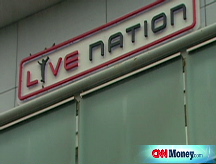Music biz antitrust issues center stage
CEOs of Live Nation and Ticketmaster answer questions from Senate antitrust panel at a hearing examining the companies' proposed merger.
NEW YORK (CNNMoney.com) -- The CEOs of Ticketmaster and Live Nation told members of a Senate antitrust panel Tuesday that their proposed merger was necessary to strengthen each company and create a new business model for a suffering industry.
The deal, which was announced Feb. 10, would combine the nation's largest seller of live entertainment tickets and the biggest concert promoter.
The merger is expected to close in the second half of the year. The hearing, held by the antitrust subcommittee of the Senate Judiciary Committee, is the government's first look at the deal, which has raised antitrust concerns.
Critics of the merger proposal complain that the arrangement will push out independent promoters, and venues will lose the leverage from two large companies fighting for their business. Some music fans and performers have criticized the two companies, saying they drive up ticket prices.
The company executives defended the merger as key in saving the industry.
"Unlike so many other businesses, we're not here today for a bailout or a tax credit or any other favor," said Michael Rapino, chief executive of Live Nation. "Instead we've come with our own self-funded renewal plan."
Live Nation owns or has operating agreements with 140 venues, 30 music festivals and 305 large arenas, according to a statement by Sen. Herb Kohl, D-Wisc, chair of the antitrust panel. Live Nation also has exclusive deals with major artists, including U2, Madonna, and the Jonas Brothers.
By some accounts, Ticketmaster controls 70% to 80% of all concert ticket sales, Kohl's statement said.
Rapino said the companies' goal is to consolidate "the fragmented pieces of the business - marketing, promotion, concerts, and ticketing - to create a full-service connection."
The merger could help Live Nation survive a difficult period, Rapino said. Its stock has sunk two thirds, and its real estate holdings have been gutted, he said.
"If we don't find a solution, we could be bought by a foreign-owned conglomerate like the majority of the record labels," Rapino said.
Nearly of 40% concert seats go unsold, he added, proving that "clinging to old ways and fighting change is not the answer."
Irving Azoff , CEO of Ticketmaster, said the merger would eliminate about $40 million of "obvious inefficiencies" in the entertainment supply chain.
"We cannot just cling to old ways," he said. "The entire entertainment industry is looking for ways to integrate ticketing and other related businesses with the rest of their supply chain."
Kohl appeared unconvinced. "You would not be talking with each other unless you were getting bigger and more profitable," he said.
"You have every right to do it, and we have every right to challenge it. But you have yet to explain the main reason for your merger."
Kohl said the subcommittee's concerns are heightened because Live Nation recently entered into the ticketing business to compete with Ticketmaster and lasted only one month.
"What does Live Nation's decision to merge with its competitor rather than fight it in the market tell us about any company's ability to compete with Ticketmaster?" he asked. "If Live Nation can't compete, who can?"
Music promoter Seth Hurwitz, co-owner of I.M.P. Productions and owner of the 930 Club in Washington, D.C., said Live Nation figured out there is no replacement for Ticketmaster.
"After announcing their own ticket system over a year ago, and spending millions to develop it, they would like to do what they have always done: Buy the competition," he said. ![]()


